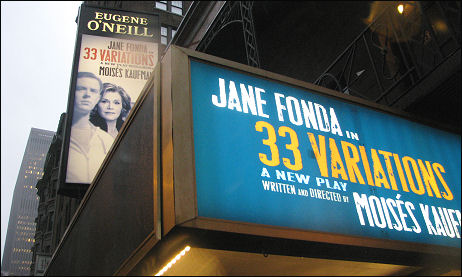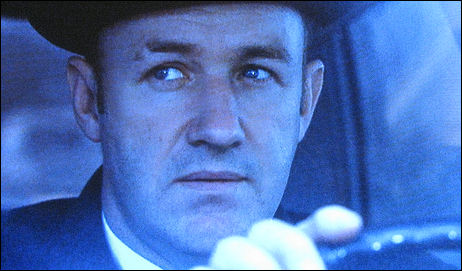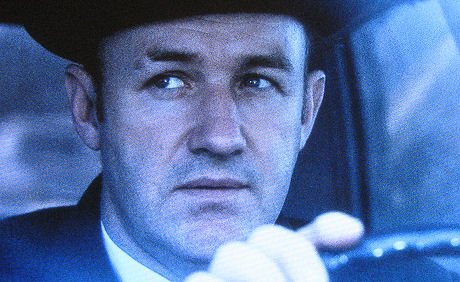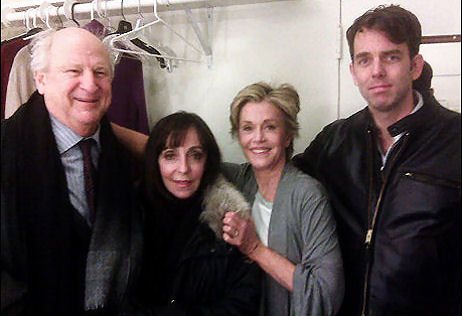
Day: February 18, 2009
Abe Goes Down
Kim Masters has updated her Slate/”Big Money” piece about the fate of Steven Spielberg‘s Lincoln project, and she says that “a knowledgable source [informs] that Paramount has passed” on the project.
This is all Spielberg’s fault since he’s the one who’s delayed and delayed and delayed and delayed. A subject of this depth and scope is beyond his abilities and he knows it, which is the deep-down reason why he’s been putting it off, I believe. Spielberg has already blown it by not shooting the film in ’07 or ’08, as releasing a Lincoln biopic right now would be perfect with Obama and the 200th anniversary and all. Later? Not so much.
The best thing that could happen to the Lincoln project would be for Spielberg to walk away and focus on directing and producing CG theme-park movies for the rest of his life — Indy 4, Tintin, Transformers 2, crap like that.
The Departed
Defamer posted an Oscar telecast death-montage questionaire earlier today. Here are my comments/answers for now:
(1) Will They Make It? (Choose One) — Arthur C. Clarke and Bernie Brillstein, for certain!; (2) Will Open the Montage — who cares but if they don’t put in Charles H. Joffe, Stan Winston, Harold Pinter and Isaac Hayes the montage guys will be guilty of dereliction; (3) Will End the Montage — a tie between Paul Newman and the team of Sydney Pollack and Anthony Minghella; (4) Will Get Montage’s First Video Clip — Newman (the picnic scene from The Hustler) or Roy Scheider (“You’re gonna need a bigger boat”); (5) Will Get Montage’s First Sound Clip — Paul Scofield (something from A Man For All Seasons); (6) First Actor/Actress Named — no comment, don’t care; (7) First Director Named — could be Jules Dassin, Minghella or Pollack…or they could be the last (who gives a shit about this stuff?); (8) First International Auteur Named — nobody cares; (9) Oldest Selection — Dassin; (10) Will Get His Own Montage Elsewhere in Oscarcast — either Newman or Pollack. (Not Charlton Heston because of his NRA support).
Hooves and Horns
Asked what he thinks about the 20th Century Fox-Warner Bros. battle over the distribution rights to Watchmen, screenwriter David Hayter has, according to this Hollywood Outbreak interview, called Fox “satan.” Hayter doesn’t mean the publicists, does he? He should be more specific. The correct thing would be to call the parties actually responsible for the legal challenge (i.e., Fox attorneys) “Satan’s emissaries,” “sons of Satan,” “the fallen angels” or words to that effect.
Off The Ground
Jane Fonda must be feeling like $10 million bucks these days. Make it $100 million. 33 Variations, the Broadway play I saw her perform in this afternoon, is a bracingly well-written, inventively staged, and deeply moving piece about fighting the demons of finality while living to the fullest, and it’s given Fonda’s comeback effort (which began about five years ago, give or take) the lustre and respectability that Hollywood failed to provide with Monster-in-Law (’05) and Georgia Rules (’07).

Fonda, yes, agreed to star in these films of her own free will but God, what a putrid and fallow place Hollywood can seem at times, especially from the perspective of the New York stage. But there’s nothing like a crackerjack Broadway play to put the rose back in everyone’s cheeks.
How good is Fonda? Very. She’s obviously deeply into what this play is about — love, passion, giving your utmost until the last. She’s confident, focused, commanding, and very connected. But so are costars Samantha Mathis, Colin Hanks (his first Broadway role), Zack Grenier, Don Amendiola and Susan Kellerman.
Directed and written by Moises Kaufman, 33 Variations doesn’t officially open until March 9th, but I can at least offer some generic alpha vibes at this stage of the game. It’s a good thing all around for Fonda, her costars, Kaufman and the audience. I left the theatre an hour or so ago feeling more than a little turned on. (I can’t do anything about the asswipes out there who will interpret that to mean something other than spiritual arousal.) The first thing I said to Roger Durling, who saw it with me, was, “I could see that again.”
Fonda plays Katherine Brandt, a somewhat emotionally remote music scholar (at least as far as Clara, her daughter, is concerned) trying to understand why Ludwig van Beethoven — whose career and powers were beginning to decline, and who needed money — spent 3 years writing 33 variations on a mediocre waltz written by a music publisher in 1819.
Kaufman’s play is an ensemble piece, however, and this involves putting Beethoven himself (Grenier) as well as his assistant Schindler (Erik Steele) as well as Diabelli (Amendolia), the original composer of the mediocre waltz, smack dab alongside the present-day characters.
Brandt’s quest, which takes her to Bonn, becomes a race against time since she’s facing a severe health problem in the form of Lou Gehrig’s disease. The gradual falling of the curtain obviously affects her relationship with Clara (Mathis) and increasingly involves her daughter’s good-guy boyfriend Mike (Hanks), a nurse, as well as a soulful German woman (Kellermann) who watches over Beethoven’s archives in Bonn.
The play, okay, could use a tiny bit of refining here and there, but it’s really quite together at this point. I was delighted how a straight play about a gifted composer who understood dance and song would include a communal sing-along at one point (which reminded me of the singing of “Wise Up” in Paul Thomas Anderson‘s Magnolia) as well as a tender little dance number.
Wank
Last night I watched William Friedkin‘s new color-desaturated, de-focused, reduced and blended with black-and-white French Connection Blu-ray, which comes out next Tuesday.

From the standard 2005 DVD. Stark, blueish, unprettified.

The Blu-ray image — lighter, quasi-bleachy, snowier, more grain.
I don’t care if this makes me sound unhip — it’s awful, a rip-off, a desecration and a five-alarm burn. The original film (i.e., the version that played in theatres in ’71 and which was captured for the 2005 standard DVD) is plenty gritty and muddy-looking on its own without Friedkin futzing around. Please, I’m telling you — don’t buy this friggin’ thing. Unless you’re a purist monk it’ll just piss you off. Trust me on this one.
Note: Some Came Running‘s Glenn Kenny is not a monk on this matter, as a recently posted essay makes clear.
Fart Vistas
“Another eerie sign came this weekend when three, count ’em, three (older) academy voters whose opinions I respect all said the exact same thing to me at different times. They weren’t voting for Slumdog Millionaire because ‘it’s just not an Oscar picture.’ I thought it was very strange that I would suddenly be hearing virtually the same kind of reasoning out of the mouths of three different academy members, but there it was. All of them, by the way, had cast their Best Picture vote for Benjamin Button.” — from Pete Hammond‘s latest Envelope column, the headline of which says “Signs Point To Big Oscar Upsets.” Bullshit.
Fonda Passion
On her daily blog, Jane Fonda describes the play she’s now performing in — 33 Variations — which I’ll be seeing this afternoon with Santa Barbara Film Festival director Roger Durling, who’s in town for a few days.

Bobby Zarem, casting director Bonnie Timmerman, Jane Fonda and “screenwriter Scott” following a performance of 33 Variations
“I play a musicologist of today who is obsessed with figuring out why Beethoven, at the height of his powers, spent 3 years writing 33 variations on a mediocre waltz written by a music publisher in 1819,” she writes. “My character is passionate in her quest for understanding, [in part or largely because] it’s a race against time for her to get a paper written on the topic and delivered to a conference because she’s sick. Beethoven, who’s also a character in the play, is also obsessed with finishing the variations because he is becoming deaf.
“Obsession, passion — these are things I love in life. The fact that people can grow old and become sick and yet their passions remain undimmed. Some of the greatest artistic works and achievements throughout the ages, have been done by people late in life — Monet, Cezanne, Degas, Matisse, Beethoven, Michelangelo, Albert Schweitzer and many others.
“Age and infirmities are as important as we allow them to be. No question that things change as we age. There are the aches and pains. Like jalopies, hub caps fall off, fenders get bent, and we keep on, making a life inspite of it…a life that, as Beethoven and others showed us, can be enriched by these corporal challenges. This play I’m entering touches on this.
“I’ll be doing this play for five months. I could be real scared. I mean, 8 shows a week after 45 years [away from the stage]! But I’m choosing to think of it as an adventure, a challenge. A friend of mine who’s 76 says that at this age you’re supposed to be retired, not looking for new adventures and that I and my friends are unusual. I don’t agree.”
Pieces of Cotton
One of my all-time favorite title sequences. Because it visually conveys — gently, economically, erotically — not just what Humbert Humbert (James Mason) will be feeling about Lolita (Sue Lyon) starting around the 10-minute mark, but the essence of the fuel that will drive the dramatic engine. An amazing feat. (Still sequence stolen from Art of the Title.)
Reed Rant
“The grim previews of the 81st Academy Awards show on Feb. 22 at the Kodak Theatre, designed by David Rockwell — the modern-day Rube Goldberg responsible for the Mohegan Sun Indian casino, the ugly sets for Hairspray and the Jet Blue terminal at J.F.K. — are already being described as ‘community theater on steroids,'” writes N.Y. Observer critic Rex Reed in a piece that went up last night at 8 pm.

“[They] include a curtain made of 92,000 crystals, a thrust stage requiring an orthopedic surgeon in residence for presenters in stiletto heels, 20 monumental Art Deco arches, the removal of the traditional orchestra pit, lights filtered through silver-rope curtains and strands of silver-leaf balls, 19 screens flying through space and fluted chandeliers floating above the audience, all dominated by the color blue. It sounds like a vulgar stage show in Atlantic City starring Siegfried and Roy, designed to turn passionate movie lovers into dyspeptic movie critics — only a handful of whom will still be awake by the time the five final (and only important) prizes of the night are announced.”
This is funny stuff, but at least Oscar show producers Bill Condon and Larry Mark are trying to re-think things and operate out of the box.
Adventures of Horowitz
MTV.com’s Josh Horowitz and his team have put together another Oscar montage in which he shares some mock-challenging emotional moments with the big acting nominees (Mickey Rourke, Sean Penn, Meryl Streep, etc.). You know, like Billy Crystal used to do when he was hosting the big show in the mid ’90s? Amusing and technically together; ends nicely with a couple of Oscar kids making actual appearances.

